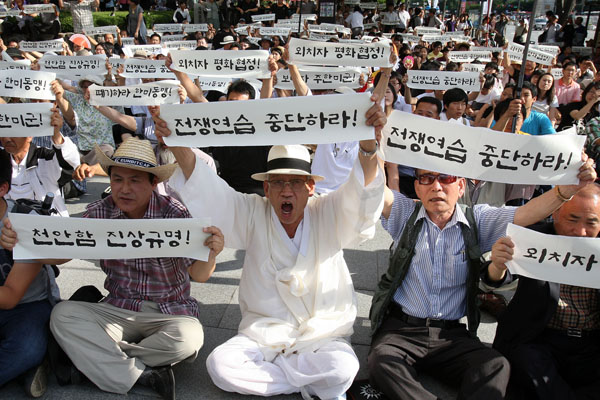US
Controversial US-ROK drill begins
By Zhang Chunyan and Tan Yingzi (China Daily)
Updated: 2010-07-26 14:43
 |
Large Medium Small |
|
 Koreans crowd around the US embassy in Seoul on Sunday to protest a US-ROK joint drill. They appealed for the truth about the sinking of an ROK warship, holding posters bearing slogans such as "Halt the warring exercise." Xinhua News Agency
|
The 97,000-ton aircraft carrier USS George Washington, along with several guided-missile destroyers from the two allies, left the southern ROK port of Busan around 7 am local time on Sunday, an official at the ROK-US Combined Forces Command told the Yonhap news agency. "Some ships from the US 7th Fleet, including a nuclear-powered submarine, are set to join them in the East Sea," the official said.
Code-named "Invincible Spirit," the four-day drill involves about 8,000 personnel from the US and ROK, 20 ships and submarines, and more than 200 aircraft. F-22 Raptors, new powerful US Air Force fighters, will fly training missions for the first time in ROK airspace. Four Japanese military officers will be on board the carrier.
The exercises have prompted an angry reaction from Pyongyang, which has threatened to retaliate with "nuclear deterrence" and "sacred war."
"Our military and people will squarely respond to the nuclear war preparation by the American imperialists and the South Korean puppet regime with our powerful nuclear deterrent," AP quoted the DPRK's government-run Minju Joson newspaper as saying in a commentary Sunday headlined, "We also have nuclear weapons."
The DPRK's National Defense Commission issued a similar threat on Saturday, saying the country "will start a retaliatory sacred war."
At a Southeast Asian security forum concluded on Friday in Hanoi, DPRK delegation spokesman Ri Tong Il told reporters, "There will be a physical response against the steps imposed by the United States, militarily."
Zhai Dequan, deputy secretary general of the China Arms Control and Disarmament Association, said the US and ROK should act with caution and not further deteriorate the security situation in the region.
Shi Yinghong, professor of international relations at Renmin University, told China Daily that the exercise inflames tensions on the Korean peninsula, and he could not rule out the possibility of a DPRK military response to the drill.
He added that the US is taking an intransigent attitude toward the DPRK and that the new sanctions it plans to impose on the DPRK would be more severe for the country.
Some anti-war activists also think the US-ROK drill will only deepen tensions in the region. According to AP, about 150 anti-war activists rallied peacefully Sunday near the US Embassy in Seoul, chanting slogans such as "We oppose the drills!" and "Scrap the ROK-US alliance!" There were no reports of clashes with riot police.
The US and ROK also plan to hold several joint naval and air drills in both the Yellow Sea and the Sea of Japan in the following months. China expressed its opposition and "deep concern" over the drill, which had previously been scheduled to take place in the Yellow Sea between the Chinese mainland and the Korean Peninsula, but was moved to the Sea of Japan on the east coast of the peninsula in deference to Chinese protests.
However, Zhai told China Daily that future drills would be held in both seas and China should do more to prevent exercises in the sensitive Yellow Sea.
"It would be provocative if the exercises were conducted close to China's territorial waters," Scott Snyder, director of the Center for US-Korea Policy of the Asia Foundation, told China Daily.
Agencies contributed to this story.
China Daily